International
Michelle Obama’s mother, Marian Robinson, dies at 86
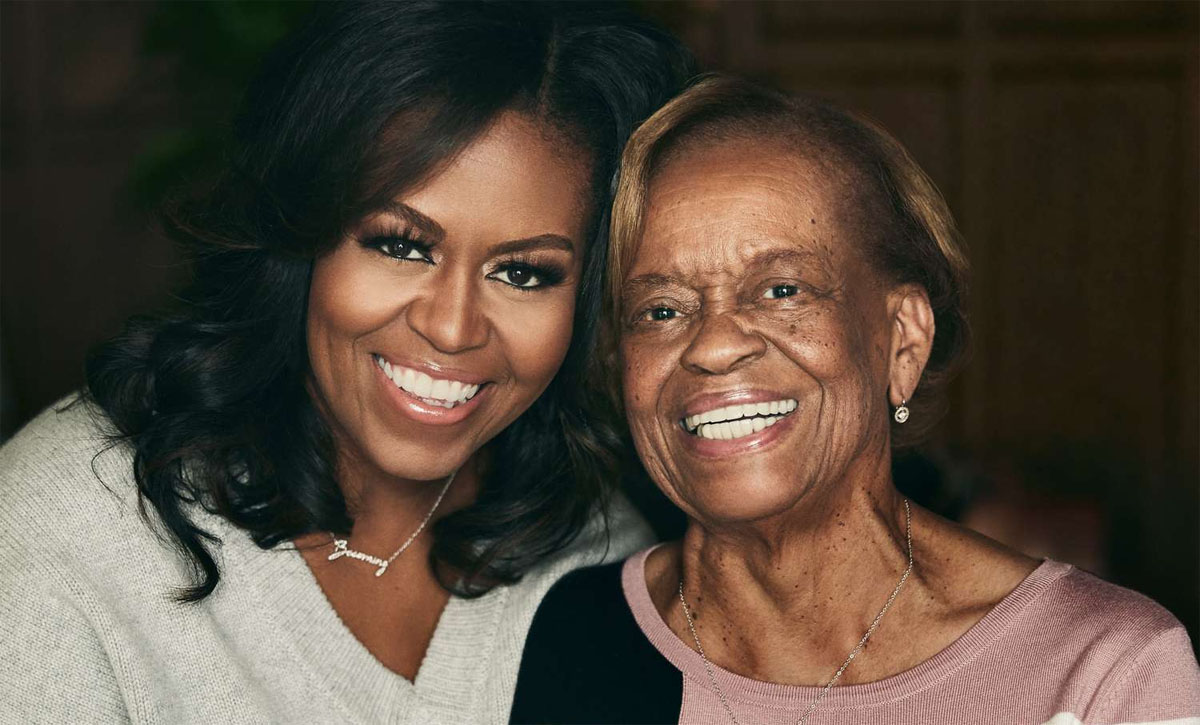
Michelle Obama’s mother, Marian Robinson, dies at 86
Marian Robinson, the mother of former US First Lady Michelle Obama, has died at 86.
In a statement, her family said that Robinson had died “peacefully” on Friday morning.
Robinson was a well-known fixture at the White House during the eight years of Barack Obama’s administration between 2009-17.
She spent much of that time taking care of her two granddaughters, Malia and Sasha, daughters to Michelle and Barack Obama.
In a statement posted on X, formerly Twitter, Mrs Obama called her mother her “rock, always there for whatever I needed”.
“She was the same steady backstop for our entire family, and we are heartbroken to share she passed away today,” she wrote.
In a separate tweet, Mr Obama said that “there was and will be only one Marian Robinson”.
“In our sadness, we are lifted up by the extraordinary gift of her life,” he added. “And we will spend the rest of ours trying to live up to her example.”
No further details were given about the cause of death.
READ ALSO:
- BREAKING: Organised Labour declares indefinite strike over minimum wage
- Otti places N25m bounty on killers of soldiers in Aba
- JUST IN: 40 directors fail permanent secretary qualifying exam
Born in 1937, Robinson grew up one of seven children in Chicago, the city where she spent much of her life before agreeing to come to Washington DC after Mr Obama’s electoral victory.
Early in her life, she studied to become a teacher before working as a secretary. She raised Michelle and her other child, Craig, together with her husband Frasier Robinson on Chicago’s South Side.
“At every step, as our families went down paths none of us could have predicted, she remained our refuge from the storm,” the Obama statement said.
“On Election Night in 2008, when the news broke that Barack would soon shoulder the weight of the world, she was there, holding his hand.”
An image taken on the night in 2008 when her son-in-law made history as the nation’s first African-American president showed Robinson sitting on a sofa with him, watching the results come in.
The statement added that Robinson had agreed to move to the White House after a “healthy nudge” from Barack and Michelle Obama, who, along with their daughters, “needed her”.
She later spoke of how she insisted on doing her own laundry there.
In an interview with CBS, the BBC’s US partner, Robinson said she had felt compelled to move to Washington because she felt “like this was going to be a very hard life” for her daughter and son-in-law.
“And I was worried about their safety,” she added. “I was worried about my grandkids. That’s what got me to move to DC.”
READ ALSO:
- Police eventually cleared Sanusi to lead the prayer
- BREAKING: Court Grants Chioma Okoli N5m Bail
- Use locust beans, ginger instead of seasoning cubes – Dietician advises Nigerians
The lifelong Chicago resident had never boarded a flight out of the US until she flew aboard Air Force One with the Obamas to France in 2009.
Robinson – whom Mr Obama once called “the least pretentious person” he knew – said that it was a “huge adjustment” to have her needs met by White House staff.
“Rather than hobnobbing with Oscar winners or Nobel laureates, she preferred spending her time upstairs with a TV tray, in the room outside her bedroom with big windows that looked out at the Washington Monument,” the family statement said.
“The only guest she made a point of asking to meet was the Pope,” it added.
Her privacy afforded her a freedom envied by the rest of her family. David Axelrod, a senior Obama advisor, told CNN on Friday “she would often slip out of the White House on her own and visit with friends”.
“She really wasn’t looking for attention,” he added.
On Mother’s Day – just weeks before Robinson’s death – Mrs Obama announced that an exhibit at the Obama Presidential Center Museum in Chicago would be named in her honour.
“In so many ways, she fostered in me a deep sense of confidence in who I was and who I could be, by teaching me to think for myself,” Mrs Obama said in a video announcement.
“I simply wouldn’t be who I am today without my mom.”
Michelle Obama’s mother, Marian Robinson, dies at 86
BBC
International
Many killed, 100 wounded as Israel airstrikes hit Beirut
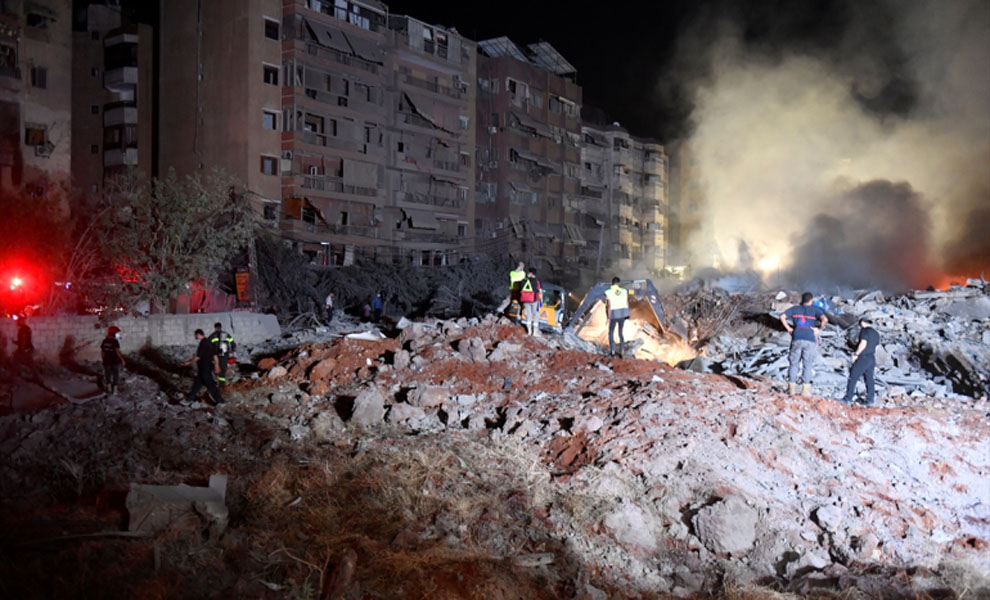
Many killed, 100 wounded as Israel airstrikes hit Beirut
BEIRUT/DUBAI/LONDON: A series of Israeli airstrikes rocked Beirut’s southern suburbs on Friday evening, erasing a residential block in the Haret Hreik neighborhood and reverberating across the Lebanese capital, rattling windows and sending a thick plume of dark smoke into the sky.
The Israeli army’s spokesperson Daniel Hagari claimed the “precise strikes” hit the central headquarters of the Iran-backed group Hezbollah, believed to be located beneath residential buildings, the AP news agency reported.
The blasts caused nationwide panic and plunged the surrounding area into chaos. Paramedics from Hezbollah’s Islamic Health Authority rushed to the scene alongside relatives of the buildings’ residents.
Others in the southern suburbs rushed into their cars and fled towards Beirut and Mount Lebanon.
Lebanon’s Health Minister Firas Abiad confirmed that “some of the targeted buildings were inhabited.”
At least two people have been killed, and hospitals in the area received more than 50 wounded from nearby buildings, including three in critical condition. Rescue teams urgently appealed for blood donations.
The Lebanese state-run National News Agency said six tall buildings in Haret Hreik have been reduced to rubble in the biggest blast to hit the capital in the past year.
Targeting Hezbollah’s secretary-general, Hassan Nasrallah, who was suspected to be in a bunker underneath the buildings, the Israeli military used F-35 aircraft and dropped 2,000 tons of explosives on the area, according to Israeli media.
Mohanad Hage Ali, the deputy director for research at the Malcolm H. Kerr Carnegie Middle East Center, told Arab News that “Israel has moved from the precision killings phase into dynamite or blast fishing; the end justifies the means.”
READ ALSO:
- Halt Mideast crisis now, Saudi urges UN Security Council
- Israel will continue attacks on Gaza, Lebanon, Netanyahu tells UN
- Igbo politicians have become mere breadwinners – Obidigbo
“They can kill hundreds to reach a target,” he continued. “This is why it is more likely a high-value target was there (in the targeted block) – this is why they (the Israeli military) took the decision.”
Israeli broadcaster Kan 11 initially reported an on-screen headline saying Nasrallah was “harmed,” but quickly followed with Israeli assessments indicating he is dead.
However, the Iranian news agency Tasnim reported that a security source confirmed Hezbollah chief Hassan Nasrallah and the group’s executive council head, Hashim Safi Al-Din, were unharmed.
Iran’s embassy in Beirut described the Israeli strike as a “serious escalation that changes the rules of the game,” threatening that there will be repercussions.
“The Israeli regime once again commits a bloody massacre, targeting heavily populated residential neighborhoods while spewing false justifications to try and cover up its brutal crimes,” the embassy wrote on the social platform X.
“There is no doubt that this reprehensible crime and reckless behavior represent a serious escalation that changes the rules of the game, and that its perpetrator will be punished appropriately.”
Analysts believe the strike on Haret Hreik reflects Israel’s dismissal of traditional wartime norms, marking the start of a new phase in the Israel-Hezbollah conflict.
“Such a strike signals a disregard for the limitations typically observed in warfare, including proportionality and ethical considerations as it is a civil populated area as Tel Aviv a city with military basis,” Rafe Jabari, a researcher on the political sociology of Arab states, told Arab News.
“The scale of the destruction implies that the Israeli government is not constrained by these principles of International Law,” he added.
Jabari also believes “the strategy being employed suggests that Israel believes that war is the solution to end further conflict.”
He explained that “airstrikes are the strategic weapons used by Israel before the invasion of the Lebanese territories as happened in the Gaza Strip.
“The Israeli army is using destruction and terrors to eliminate any opposition to its occupation and colonization policy.”
“However, this approach is wrong,” Jabari continued. “Rather than achieving lasting peace, the continuation of such military actions is likely to provoke further instability and insecurity across the region.”
“Instead of bringing about an end to hostilities, this escalation will fuel the conditions for more wars and destruction in the future including this one.”
READ ALSO:
- Nigeria, UAE seal flight rights deal ahead of Emirates return
- Igbo politicians have become mere breadwinners – Obidigbo43 killed as Hurricane Helene ruins southeast US
- Four journalists remanded for alleged false publication against GTB boss
Likewise, Beirut-based political analyst Nader Ezzedine said: “By targeting Hezbollah chief Hassan Nasrallah, regardless of the outcome, Israel has chosen to break all established conflict rules and red lines that had been observed in its previous wars with Hezbollah.”
He told Arab News that “whether the outcome of this strike results in Nasrallah’s death or his survival, it will have significant ramifications for the conflict.”
“Hezbollah initially tried to adhere to certain rules in the hopes that an agreement can be reached to end the war in Gaza and Lebanon,” he added. “However, after this strike, I no longer believe this war will have any rules or limits.”
However, Ezzeddine believes that while the strike may have dealt a significant blow to Hezbollah and undermined its fighters’ morale, “it will not end the war but will likely intensify the fighting even further.”
“This strike will not end the conflict if Israel aimed to do so by killing Nasrallah,” he said. “Instead, it will certainly cause a huge escalation.”
He also expects this strike to be followed by an Israeli ground invasion, while Hezbollah may escalate its attacks against Israel.
Middle East expert Jabari noted that “we are witnessing an open war worse than the one in 2006. The Israeli army and government are choosing weapons as a means of negotiation instead of political and diplomatic endeavors.”
On Wednesday, Sep. 25, Israel’s military chief Herzi Halevi told troops that its airstrikes in Lebanon aimed to destroy Hezbollah’s infrastructure to pave the way for a possible ground incursion, CNN reported.
These comments came after the Israeli army intercepted a missile that Hezbollah said it had shot at the headquarters of Mossad, Israel’s intelligence agency, near the Israeli city of Tel Aviv.
A day earlier, an Israeli airstrike on Beirut killed senior Hezbollah commander Ibrahim Qubaisi, who reportedly led the group’s missile and rocket force.
Reports of Friday’s strikes came less than an hour after Israeli Prime Minister Benjamin Netanyahu’s address at the UN General Assembly, in which he vowed to continue his military operation in Lebanon despite a US ceasefire proposal demanding a 21-day pause in the fighting between Israel and Hezbollah.
Israel’s onslaught on Lebanon, which it says aims to eliminate Hezbollah, has killed within a few days 720 Lebanese people, many of them women and children, according to Lebanon’s health ministry.
Since October 8, after Israel launched its onslaught on Palestine’s Gaza Strip, Israel and Hezbollah have been exchanging cross-border fire. But in the last week, Israel dramatically intensified its airstrikes in Lebanon, claiming the goal is to end Hezbollah’s 11 months of attacks on its territory.
Many killed, 100 wounded as Israel airstrikes hit Beirut
ARAB NEWS
International
Halt Mideast crisis now, Saudi urges UN Security Council
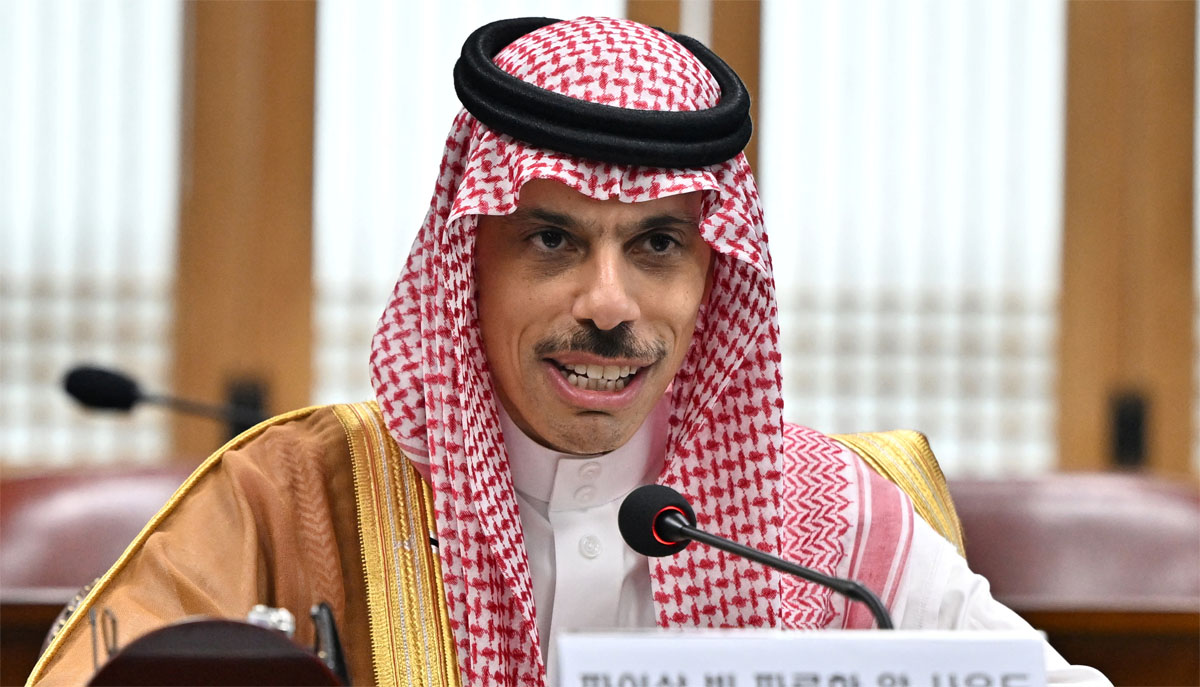
Halt Mideast crisis now, Saudi urges UN Security Council
RIYADH: Saudi Foreign Minister Prince Faisal bin Farhan on Friday urged the United Nations Security Council to get its act together and find a way to stop the Israeli-Palestinian conflict from widening further.
Speaking at a Security Council meeting in New York, Saudi Arabia’s top diplomat lamented that despite the successive resolutions passed by the General Assembly, there is no end in sight to the
“catastrophic humanitarian situation” the people of Gaza are facing.
Prince Faisal made the plea as fighting between Israel and the Hezbollah continued to escalate, with Israel expanding its air strikes to the southern suburbs of the Lebanese capital, Beirut, while Hezbollah targeting key Israeli facilities with missiles.
He faulted members of the council for being quick to use the veto rather than find consensus to resolve the Gaza crisis. He noted that since last October there were six draft resolutions where the veto was used out of ten.
READ ALSO:
- 43 killed as Hurricane Helene ruins southeast US
- Four journalists remanded for alleged false publication against GTB boss
- Reps summon EFCC chair, VeryDarkMan, Bobrisky over bribery allegations
Even then, he said, the resolutions that were adopted failed to achieve a ceasefire, failed to address the catastrophic humanitarian situation, and failed to pave the way for a creditable political path towards peace.
Last March, Russia and China vetoed a US-proposed resolution calling for an immediate ceasefire in Gaza and an Israel-Hamas hostage deal. Other resolutions saw the US objecting and Britain abstaining.
In the 15-member Security Council, the permanent members — Britain China, France, Russia and the US — are entitled to a special voting power known as the ‘”right to veto.” A veto could defeat a resolution even if it is supported by a majority of the council members.
“What does the UNSC need to end the suffering, to implement international law?,” Prince Faisal said. “It is clear there is a widening gap between international consensus and divides within the Security Council, which undermine its performance.”
Prince Faisal cited the General Assembly for passing successive resolutions that reflected what countries where calling for: the urgent need for a ceasefire, providing humanitarian assistance to the Gaza Strip without interruption, and the right of Palestinians to self determination,
“We value the resolution of the General Assembly that recognized the eligibility of Palestine for full membership at the UN, by virtue of which Palestine received additional privileges, as well as the latest resolutions that called on Israel to end its occupation of Palestinian territory, he said.
Halt Mideast crisis now, Saudi urges UN Security Council
International
Israel will continue attacks on Gaza, Lebanon, Netanyahu tells UN
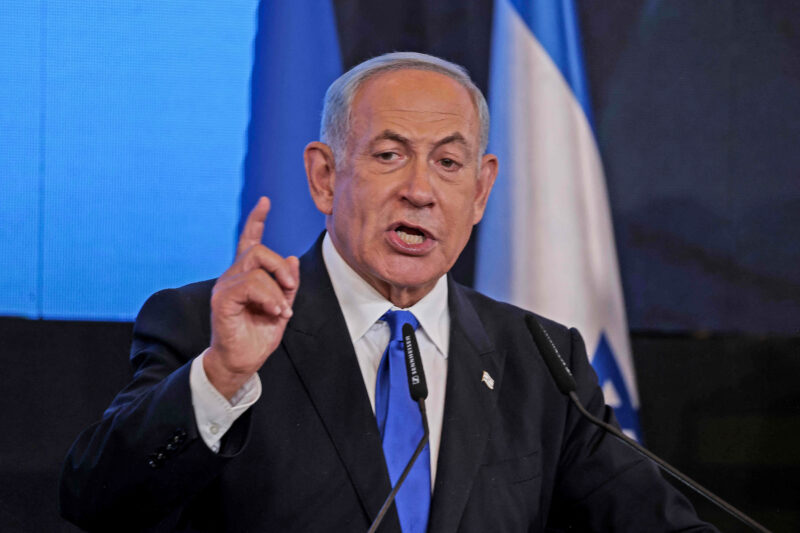
Israel will continue attacks on Gaza, Lebanon, Netanyahu tells UN
Prime Minister Benjamin Netanyahu has pledged Israel will fight until “total victory” in its continuing war on Gaza and promised to continue attacks on the Lebanese armed group Hezbollah, as hopes faded for a ceasefire that could head off an all-out regional war.
Several delegations walked out as Netanyahu approached the lectern to speak while supporters in the gallery cheered.
“I didn’t intend to come here this year. My country is at war fighting for its life,” Netanyahu said on Friday.
“But after I heard the lies and slanders levelled at my country by many of the speakers at this podium, I decided to come here and set the record straight.”
Israeli attacks on Gaza have killed more than 41,500 Palestinians and wounded more than 96,000 others since October 7, according to the Palestinian Health Ministry.
More than half of those killed were women and children, including about 1,300 children under the age of two.
Israel launched the assault on Gaza in response to a Hamas-led attack on southern Israel, which killed at least 1,139 people, mostly civilians, according to an Al Jazeera tally based on official Israeli figures, with about 250 others seized as captives.
Israeli leader told the 193-member assembly that the Palestinian group Hamas, which governs Gaza, should have no role in the reconstruction of the territory.
READ ALSO:
- Nigeria, UAE seal flight rights deal ahead of Emirates return
- Igbo politicians have become mere breadwinners – Obidigbo43 killed as Hurricane Helene ruins southeast US
- Four journalists remanded for alleged false publication against GTB boss
“If Hamas stays in power, it will regroup … and attack Israel again and again and again … So Hamas has got to go,” he told the United Nations General Assembly on Friday.
The United States, along with Egypt and Qatar, has been trying unsuccessfully to reach a ceasefire that would end the war and secure the release of the captives.
“This war can come to an end now. All that has to happen is for Hamas to surrender, lay down its arms and release all the hostages,” Netanyahu said.
“But if they don’t – if they don’t – we will fight until we achieve total victory. Total victory. There is no substitute for it. “
He said Israeli forces have destroyed “90 percent” of Hamas’s rockets and killed or captured half of its forces.
Hamas accused Netanyahu of telling “blatant lies” in his speech.
Netanyahu “continued his series of blatant lies and escalated his threats against the peoples of the region, while … expanding his circle of crimes to include our people in Lebanon”, a statement from the Palestinian group said.
Al Jazeera’s senior political analyst Marwan Bishara said the US government gave Israel the greenlight to use self-defence as a rationale for its war on Gaza by drawing a parallel between Hamas’s October 7 attack and Russia’s invasion of Ukraine.
“It then went on to shield it, to arm it, to finance it and to defend it at the United Nations and that’s why we need to remember that Netanyahu has the arrogance to come to the UN and lecture the world, because the US supports him, a war criminal,” he said.
‘Enough is enough’
The prime minister also told world leaders that his nation will “continue degrading” the Lebanese armed group Hezbollah until it achieves its goals along the Israel-Lebanon border.
READ ALSO:
- Igbo politicians have become mere breadwinners – Obidigbo
- Four journalists remanded for alleged false publication against GTB boss
- Reps summon EFCC chair, VeryDarkMan, Bobrisky over bribery allegations
Israel and Hezbollah have been exchanging fire almost every day since October 8, when the Iran-aligned group fired rockets at Israel in what it says was an act of solidarity with Palestinians under attack in Gaza.
Most of those exchanges have been contained to the region around the Israel-Lebanon border. But Israel’s military dramatically escalated its attacks on Hezbollah in recent days, killing more than 600 people in Lebanon since Monday in a wave of air raids, according to Lebanon’s Ministry of Public Health.
“Israel has every right to remove this threat and return our citizens to their home safely. And that’s exactly what we’re doing … we’ll continue degrading Hezbollah until all our objectives are met,” Netanyahu said.
“Just imagine if terrorists turned El Paso and San Diego into ghost towns … How long would the American government tolerate that?” he said, shaking his fist in emphasis.
“Yet Israel has been tolerating this intolerable situation for almost a year. Well, I’ve come here today to say: Enough is enough.”
Israel and the Lebanese group have driven tens of thousands of people from their homes on both sides of the border.
Late Wednesday, the US, France and other allies jointly called for an “immediate” 21-day ceasefire to allow for negotiations as fears grow that the violent escalation in recent days – following 11 months of cross-border exchange of fire – could escalate into an all-out war.
The United Nations has said that more than 90,000 people have been displaced since Monday in Lebanon.
The two speakers who preceded Netanyahu on Friday each made a point of criticising Israel’s war on Gaza. “Mr Netanyahu, stop this war now,” Slovenian Prime Minister Robert Golob said as he closed his remarks, pounding the podium.
Pakistani Prime Minister Shehbaz Sharif also denounced the Israeli assault on Gaza. “This is not just a conflict. This is systematic slaughter of innocent people of Palestine,” he said.
Israel will continue attacks on Gaza, Lebanon, Netanyahu tells UN
Source: Al Jazeera and news agencies
-

 metro3 days ago
metro3 days agoFemi Falana, son Falz hit VDM on Bobrisky prison bribery allegations
-
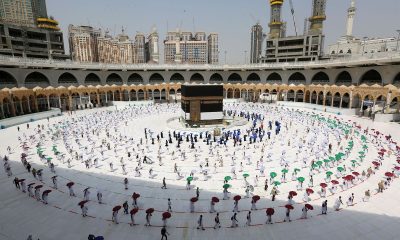
 News3 days ago
News3 days ago2025 Hajj: Lagos fixes N8.5m as initial deposit
-

 News2 days ago
News2 days agoAkwa Ibom govt confirms death of state gov’s wife
-

 metro3 days ago
metro3 days agoBobrisky was never in prison, says RadioGad, gives evidence
-

 metro3 days ago
metro3 days ago11 states panic as water release from Lagdo Dam begins
-

 Politics3 days ago
Politics3 days agoAPGA plots to suspend Soludo over alleged anti-party activities
-

 News3 days ago
News3 days agoFG increases NYSC members allowance to N77,000
-

 News2 days ago
News2 days ago[BREAKING] FG begins new minimum wage payment to civil servants

